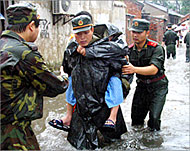Erratic climate hits people worldwide
Global warming appears to have triggered extreme climatic conditions around the world with severe heat in Europe, intense cold weather in Latin America, excessive rain and floods in Asia and a hurricane on the verge of hitting North America.

According to the Intergovernmental Panel of Climatic Change (IPCC), global warming is causing extensive changes in weather patterns around the world. Since reliable world-wide meteorological records were established in the mid-19th century, the average temperature of the world has risen by about 0.6°C.
Over the past 20 years the burning of fossil fuels – coal, oil and gas as well as changes in land use, especially deforestation, have contributed to the unpredictable weather, it says.
Algeria has witnessed 12 deaths in the last week as temperatures soared to 57 degrees Celsius (135 Fahrenheit), local authorities said.
Claudette
In North America, off the coast of Texas, Hurricane Claudette churned at 121 km per hour as it headed towards land. Angry seas forced surfers, swimmers and oil workers to flee the area.
Claudette is a Category 1 hurricane, the lowest on the Saffir-Simpson scale of strength. These storms pack winds of up to 95 mph and cause minimal damage.
But authorities were taking no chances. Residents on the path of the hurricane evacuated their homes and offices shut down.
In Latin America, in Peru’s high-altitude region in the southeast, the number of the dead from extreme cold temperatures has risen to at least 60, all children. About 60,000 people have become ill with lung infections due to the extreme cold, measuring 23 degrees below zero Celsius (nine degrees below zero Fahrenheit).
Heat wave
Europe is experiencing a blistering heat wave. Temperatures have touched 37 degrees Celsius (100 degree Fahrenheit) for the first time in Britain. The highest temperature recorded in Britain so far was 99F in 1990.
The heat seeped as far north as Finland, where the temperature hit 29.8C in the southeastern town of Utti. The average there at this time of the year is a mere 19C.
In Germany, the Frankfurter Allgemeine Zeitung newspaper warned that if Europe continued to experience hotter, drier weather, Berlin and the surrounding Brandenburg region could become a desert by the middle of this century.
 |
|
Military-scale operations |
In Asia, heavy monsoon rains have forced more than 650,000 people from their homes in India and Bangladesh. At least 260 people have died in rising waters, lightning strikes and mudslides since the monsoon hit in June.
Some 81 people were reported dead or missing from landslides in the upper reaches of the Yangtze river basin in China. Workers along the central Huai river valley rushed to strengthen dykes, ahead of more forecast rain. In all, 569 people have died from flooding this year in China.
The IPCC says such weather is expected to continue in the next few years unless environmental conservation is treated with high priority and eco-friendly practices are encouraged.